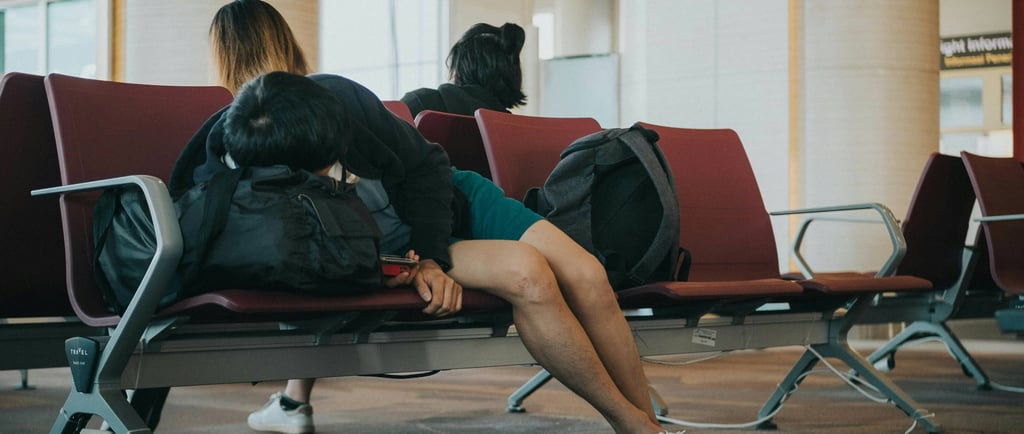What's your Travel Energy Style? Take the Quiz
The Arrival Crash: Why You Feel Drained After Travel (And How to Prevent It)
A description of Why You Feel Drained After Travel and what to do about it
Brava Braun
8/31/20252 min read
You step off the plane, suitcase rolling behind you, ready to embrace your trip. But instead of excitement, you’re hit with a wave of exhaustion. Your head aches, your digestion feels off, and even the simplest things — like finding your hotel room key — feel overwhelming.
This, my friend, is The Arrival Crash.
I’ll never forget the time I flew last minute to Copenhagen. I hadn’t prepped, I didn’t pack with intention, and I told myself I could just “push through.” By 3 p.m. local time, I was so depleted that I literally found a park bench and curled up to sleep while waiting for my hotel room to be ready. Instead of feeling enchanted by a new city, I felt foggy, irritable, and completely out of sync.
That’s when I realized — it’s not about willpower. It’s about rhythm, rituals, and respecting what my body needs when I travel.
What Exactly Is the Arrival Crash?
The Arrival Crash is that sudden slump that shows up shortly after you reach your destination. It’s more than simple jet lag — it’s a perfect storm of exhaustion, irritability, bloating, headaches, and sometimes even anxiety or sleeplessness.
I think of it as my nervous system, circadian rhythm, and immune system all waving a little white flag at the same time.
Why Does It Happen?
Here’s what I’ve learned (and lived through many times):
Circadian rhythm disruption. Crossing time zones confuses your internal body clock. My brain still thinks it’s midnight in Toronto when I’m trying to sip my morning espresso in Paris.
Nervous system overload. Travel is stimulating: airports, crowds, noise, constant decisions. My stress hormones stay elevated long after I’ve landed.
Immune system dip. Recycled airplane air, broken sleep, and exposure to new microbes can make me more vulnerable.
Midlife hormone sensitivity. As a woman in midlife, my fluctuating estrogen and progesterone make me even more sensitive to stress, sleep disruption, and inflammation. What used to be a “one-night recovery” in my 20s now lingers for days if I’m not intentional.Embrace the Journey!
Travel is a beautiful opportunity to connect, explore, and grow. While the arrival crash might be a pesky side effect, understanding why it happens and how to tackle it head-on can lead to a more enjoyable experience. So, the next time you find yourself feeling drained, remember the tips above and embrace the journey. After all, every trip should leave you feeling inspired, not exhausted!
How I Prevent (and Recover From) the Crash
That Copenhagen trip taught me the hard way. Since then, I’ve learned a few simple rituals that make those first 24–48 hours so much easier. They’re not complicated, but they completely change how I feel when I arrive.
Before I fly: I drink plenty of water the day before, eat lighter meals, and make sure to move my body — even a quick yoga flow or walk helps me feel more balanced.
On the plane: I use breathwork to calm my nervous system — a simple inhale for 4, exhale for 6. I also stretch and move every hour to keep my energy flowing.
When I arrive: I find a patch of grass or sand and stand barefoot for a few minutes to ground myself. Morning sunlight the next day is my secret weapon for resetting my sleep.
From Crash to Vitality
The Arrival Crash isn’t a weakness — it’s just your body asking for rhythm and care. Since adopting these small practices, I’ve gone from stumbling through my first days abroad in a fog to landing energized, present, and excited for what’s ahead.
And you can too.
Because every woman deserves to arrive with vitality — not exhaustion.


Wellness
Personalized travel wellness for energized journeys.
Travel
get our Vitality in motion newsletter
travel@bravabraunwellness.com
© 2025. All rights reserved.
